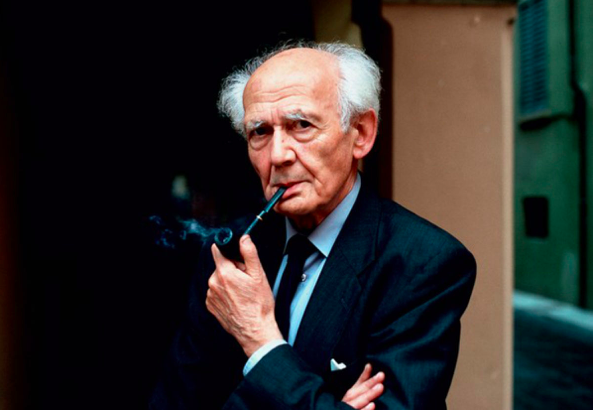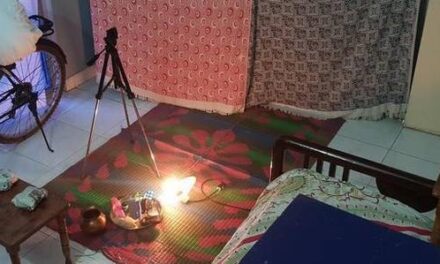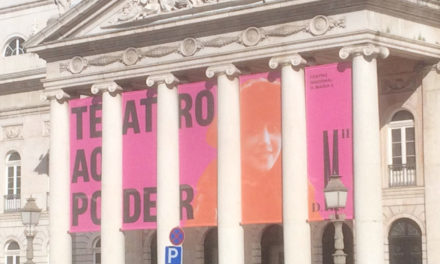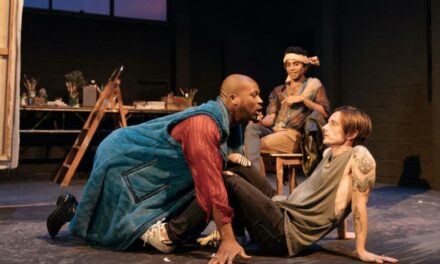Writing is currently a challenge for many reasons – an important one being that we don’t know which kind of coming world we are writing for. If I manage to reboot my academic writing again, I will finish a) a backstage article that has been brewing for years, and b) something about Peter Zadek, Zygmunt Bauman and dramaturgies of exile. Last year, which feels like last century, I worked on a presentation for the Theatre and Performance Research Association’s Directing and Dramaturgy working group. It started with Brexit and the hostile environment and then took a turn towards exile and belonging.
Whilst I have (fearfully) tried to park my thoughts about Brexit for overload reasons, I have been thinking about exile and belonging a lot. Why? I am not exiled from my homeland – in fact, I have two homelands, two passports, two languages, two opportunities to belong. I was born in the UK and we were economic migrants to Germany in 1972, the land of opportunity for opera and theatre, where my parents managed to earn a living wage. I was educated and formed in Germany – sometimes concerned I was neglecting my other language and culture. An MA in English and German Literature helped me to address this balance.
I then returned to the UK at the same time as lots of fellow Germans moved to British universities. It was the land of academic opportunity. We felt welcome in the late 1990s and put down roots, until the 2016 referendum watershed accelerated a growing sense of estrangement. Political estrangement, that is – or is it?
Wasn’t there another feeling of not belonging that had always underpinned life in the UK? Hadn’t people keenly fed back to me that my accent was English, but my intonation (and my directness!) were more German, they thought? Hadn’t it felt “wrong” to utter criticism not wrapped in ironic distance? Had I not raised eyebrows by calling out wartime stereotypes and asserting that ironic Hitler salutes were not funny (which confirmed that Germans don’t have a sense of humor)? The paradox between adapting and losing a sense of origin, of self, is something every person moving between countries and languages encounters.
While processing these thoughts last year, I revisited some of the writings and interviews of Peter Zadek (1926-2009), one of the most important post-war German theatre directors. Born in Berlin to a Jewish family, he had emigrated to the UK with his parents in 1933, where he trained as a director and worked in weekly rep in the 1950s. Zadek made the initial choice to assimilate, “to play the Englishman one hundred percent”, but nonetheless felt he could only get so far before hitting a wall: “Da war diese erstaunliche englische Wand” (“there was [always] this astonishing English wall”). After deciding that English “codes” would remain a mystery to him, he got bored with trying to belong and returned to Germany, where – again – he had the status of outsider and foreigner, because he was “English to such an extent”.
So, Zadek built a career on being an outsider, of moving between his two identities: he was given space and money to experiment by the subsidized German regional rep system and created “traveling companies” of preferred collaborators, based on his experience of UK regional touring in the 1950s. He rose to prominence particularly through iconoclastic productions of Shakespeare: deconstructions, reinterpretations, durational happenings. This exorcised any residual UK-influenced loyalty to text he might have felt, although he always preferred English and Scandinavian playwrights to German ones.
In some ways, Zadek was a role model for hybrid, transnational practitioners – and, with an artistic and academic backlash against the surge of nationalism over the past four years, creatives are now more determined than ever to pursue the international, multilingual and multicultural in their approaches. In the UK, artists are defiantly counteracting a looming Brexit with its retrogressive politics (or “retrotopian,” as Zygmunt Bauman called it in 2016). In the UK, Brexit and the effects of the hostile environment have shaped many political, performative responses. Similarly, in Germany, the far-right AfD party entering parliament in 2017 has resulted in creative responses to a political resurgence of “othering.”
On a good day, I feel as though I have taken my state of not-belonging, of being an outsider, and adapted it to benefit my professional practice: looking in two directions at once, not standing still. After all, “Wenn ich stillstehe, verstehe ich nichts” (“If I stand still, I understand nothing”), as Marianne Van Kerkhoven puts it in her articulation of the dramaturgical condition (co-opting Hans-Magnus Enzensberger).
I wonder whether the process of adapting to another country and culture has its parallels with production dramaturgy. Based on my experience, the feeling of “insider” is strongest in the nascent stages of a creative project, often a non-hierarchical partnership within a small group; similarly, I worked hardest at being an insider in my first few years back in the UK – analyzing every snippet, every piece of information and storing it for use. In production dramaturgy, ideas are converted into practice and carry the promise of being realized in performance; in immigration, performative behavior carries the promise of belonging once the performance has been perfected.
Once a theatre project is moving towards its eventual shape, a dramaturg’s input starts changing – it is less expansive and more pragmatic, suited to supplying creatives and cast with information and ideas to realize the agreed concept. Once an immigrant has mastered day-by-day interaction, they too might become more pragmatic, focusing their intercultural work onto specific aspects of their lives and their work, gradually discovering that total assimilation will not and should not take place.
The later production process is often not the time for the dramaturg to “disappear into” the work, but to periodically disappear from it instead. Dramaturgs have to cross the bridge between insider and outside eye time and time again. Once a project has shifted from the ideas of a few people to collaborative ownership, a phenomenon which I call “the gradual disappearance of the dramaturg in rehearsal” often takes place. If you have done your work well, you have equipped the creatives to run with ideas independently, and it requires sensitivity and resilience to let go after being at the center of creation in the early process. The analogy is starting to feel a bit strained now, but it nevertheless takes a similar resilience from the immigrant to manage all the phases of the adaptation process – to know when to hang on to one’s origins, and when assimilation is of the essence.
I wonder if this analogy between dramaturg and immigration or exile has its genesis in Zygmunt Bauman, who was exiled twice during his long life and career:
In terms of thinking and in the intellectual world, being an outsider is a privileged position. Being untied, “unfixed,” so to speak, undetermined, underdefined. The fact that I could bring together my experience of different kinds of society, none of them being completely my ‘home’ in which I felt fully “chez moi,” that is very helpful.
References:
“Ein Mann auf der Flucht”, Interview with Peter Zadek, Die Zeit, No. 42, 14 October 2010.
Marianne van Kerkhoven “Wenn ich stillstehe, verstehe ich nichts”, SARMA (Laboratory for discursive practices and expanded publication), 1989.
See also Van Kerkhoven, “European dramaturgy in the twenty-first century”, ch.26 in Magda Romanska, Routledge Companion to Dramaturgy (2014).
Simon Tabet, “Interview with Zygmunt Bauman: From the Modern Project to the Liquid World”, Theory, Culture & Society, Volume: 34, Issue: 7-8, Page(s): 131-146. December 1, 2017.
I attended Bauman’s last lecture at the University of Leeds (5 October 2016), titled “Europe’s Adventure: Still Unfinished?”, and a recording is available here.
Dr. Kara McKechnie is a German-Scottish hybrid. Born in London and educated in Germany, she worked for Opera Stuttgart, Opera Karlsruhe, Heidelberg Theatre et al. Her academic career started at Heidelberg University and continued at De Montfort University (Ph.D. thesis on Alan Bennett; monograph 2007). She has worked as a Lecturer in Dramaturgy at Bretton Hall, then the University of Leeds, since 2000 and teaches and supervises for the Schools of Performance & Cultural Industries and the Schools of Music. She has worked with Opera North and Leeds Playhouse on many projects, has published a monograph on Opera North (2014) and regularly collaborates with opera director Alessandro Talevi in the UK and Italy. Kara is resident dramaturg for Slung Low (Leeds), funded by the Gulbenkian Foundation. Slung Low has “repurposed” as a hub for food bank referrals. Its short film, The Good Book, is released online on 1 May 2020.
This blog entry appeared on the Blog of the Dramaturgs’ Network on 27 April 2020, as part of the Invisible Diaries series, and has been reposted with permission.
#InvisibleDiaries
This post was written by the author in their personal capacity.The opinions expressed in this article are the author’s own and do not reflect the view of The Theatre Times, their staff or collaborators.
This post was written by Kara McKechnie.
The views expressed here belong to the author and do not necessarily reflect our views and opinions.


















